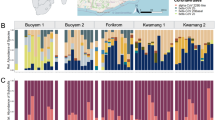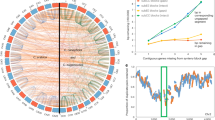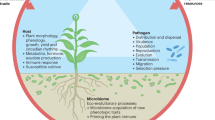Abstract
FRAZIER1 has reported recently that certain strawberry viruses in California are transmissible by five species of aphids in addition to the long-established vector, and common strawberry aphid, Pentatrichopus (Capitophorus) fragæfolii (Ckll.)2. In Britain only P. fragæfolii and the closely related P. tetrarhodus Walk, were shown3 to transmit crinkle, and only the former is known to transmit yellow-edge4.
This is a preview of subscription content, access via your institution
Access options
Subscribe to this journal
Receive 51 print issues and online access
$199.00 per year
only $3.90 per issue
Buy this article
- Purchase on Springer Link
- Instant access to full article PDF
Prices may be subject to local taxes which are calculated during checkout
Similar content being viewed by others
References
Frazier, N. W., J. Econ. Ent., 44, 258 (1951).
Plakidas, A. G., J. Agric. Res., 36, 1057 (1927).
Whitehead, T., and Wood, C. A., Nature, 148, 597 (1941).
Massee, A. M., J. Pomol., 13, 39 (1935).
Prentice, I. W., and Woollcombe, T. M., Ann. App. Biol., 38, 395 (1951).
Author information
Authors and Affiliations
Rights and permissions
About this article
Cite this article
POSNETTE, A. New Vectors of Strawberry Viruses. Nature 169, 837–838 (1952). https://doi.org/10.1038/169837b0
Issue Date:
DOI: https://doi.org/10.1038/169837b0
This article is cited by
-
Virus Diseases of Fruit Crops
Nature (1952)
Comments
By submitting a comment you agree to abide by our Terms and Community Guidelines. If you find something abusive or that does not comply with our terms or guidelines please flag it as inappropriate.



